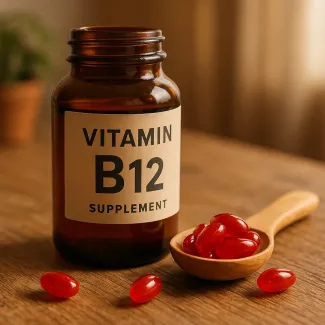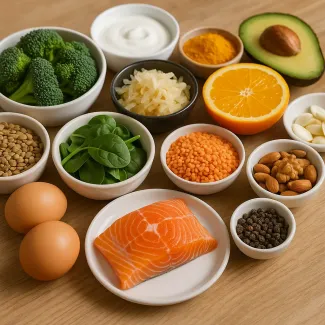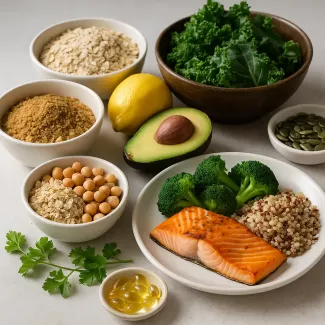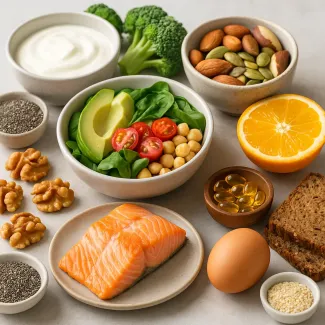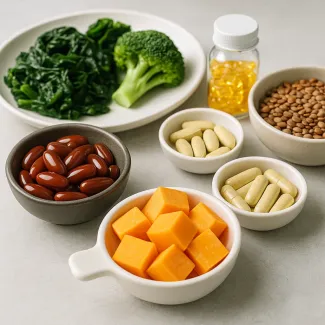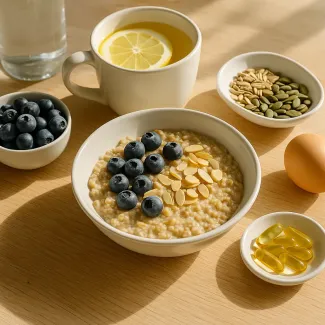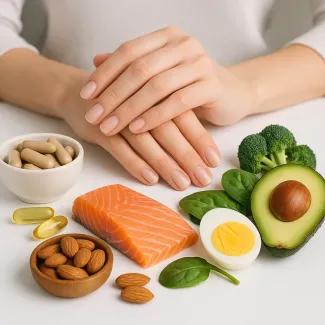
Unlocking Nail Health: Nutrients That Truly Make a Difference
How nutrients influence nail strength, growth and appearance
Healthy, beautiful nails aren’t just a matter of aesthetic appeal—they’re a direct reflection of what’s happening inside your body. If your nails are brittle, slow-growing, peeling or discolored, your diet may be lacking key nutrients that are essential for optimal nail strength and regeneration. In this comprehensive guide, we’ll explore the vitamins and minerals that play the most crucial roles in nail development, how to include them in your everyday routine, and which signs may indicate you're not getting enough.
The anatomy of your nails and why nutrition matters
Understanding nail composition
Your nails are made primarily of keratin, a type of protective protein also found in skin and hair. For keratin to be produced effectively, your body requires a consistent supply of amino acids, vitamins, and minerals. Without this nutritional support, your nails can become soft, flaky, or develop vertical ridges.
Common signs of nutrient deficiencies in nails
- Brittle nails that chip easily
- White spots or lines
- Slow growth
- Peeling layers
- Discoloration
Each of these symptoms may signal a specific deficiency, which we’ll now explore in detail.
Vitamin B7 (Biotin): The foundation of strong nails
Biotin is often hailed as the #1 vitamin for nail health, and for good reason. It plays a fundamental role in keratin production, and studies show that consistent biotin supplementation can lead to thicker, harder nails with fewer splits and breaks.
Best sources of biotin
- Eggs (especially yolks)
- Almonds
- Sweet potatoes
- Spinach
- Salmon
Daily dosage
Experts recommend 30–100 mcg daily, depending on your individual needs.
Vitamin C: Essential for collagen synthesis
While Vitamin C is often associated with immune support, its role in collagen production makes it equally critical for nail strength and structure. Collagen helps bind keratin together, giving nails their resilience and shape.
Signs you need more vitamin C
- Curved or spoon-shaped nails
- Slow nail healing after trauma
- Easy bruising around nail beds
Sources of vitamin C
- Oranges and citrus fruits
- Red peppers
- Strawberries
- Kiwi
- Broccoli
Vitamin E: Moisture and flexibility
Vitamin E is a powerful antioxidant that protects nail cells from oxidative stress while promoting moisture retention. If your nails tend to peel or your cuticles are constantly dry, this vitamin could help restore balance.
Benefits of vitamin E for nails
- Reduces cracking and splitting
- Supports healthy cuticles
- Improves blood flow to the nail matrix
Foods high in vitamin E
- Sunflower seeds
- Avocados
- Olive oil
- Almonds
- Hazelnuts
Iron: Fuel for growth and color
Iron plays a pivotal role in oxygenating blood, and a deficiency can lead to pale, thin, or concave nails. It’s also one of the most common deficiencies among women.
Symptoms of low iron affecting nails
- Spoon-shaped nails (koilonychia)
- Blue-ish nail beds
- Thin, easily bent nails
Top iron-rich foods
- Red meat
- Lentils
- Pumpkin seeds
- Tofu
- Spinach (especially cooked)
Zinc: Cellular repair and immunity
Zinc supports cell reproduction and the function of enzymes that regulate growth. A deficiency in zinc can impair nail regeneration, leading to slow growth and deformities.
Zinc-rich food sources
- Shellfish, especially oysters
- Chickpeas
- Cashews
- Quinoa
- Eggs
Protein and amino acids: The building blocks of keratin
Without adequate protein, your body can’t produce enough keratin. This can result in fragile nails that break under minimal stress.
Complete protein sources
- Poultry and lean meats
- Eggs
- Dairy products
- Legumes (beans, lentils)
- Soy products
Including a balance of essential amino acids, especially cysteine and methionine, is key for nail resilience.
Omega-3 fatty acids: Preventing nail dryness and inflammation
These healthy fats support hydration, reduce inflammation and improve overall nail texture.
Key benefits of omega-3s
- Improves nail elasticity
- Prevents brittleness
- Supports nail bed health
Omega-3 food sources
- Fatty fish like salmon and sardines
- Walnuts
- Flaxseeds
- Chia seeds
Magnesium: Stress protection and protein synthesis
Magnesium helps your body manage stress, which can otherwise manifest in your nails as vertical ridges or poor growth. It also supports protein synthesis, including keratin.
Foods high in magnesium
- Dark leafy greens
- Bananas
- Avocados
- Brown rice
- Dark chocolate
Vitamin A: Regulating keratin and cell turnover
Vitamin A plays a dual role in both skin health and nail regeneration. It helps regulate keratinocyte activity, which is necessary for smooth, strong nail growth.
Sources of vitamin A
- Carrots
- Sweet potatoes
- Kale
- Liver
- Apricots
How to spot vitamin imbalances through nail appearance
Horizontal ridges
Often linked to zinc or protein deficiency or major illness.
White spots
May suggest zinc or calcium deficiency, or result from minor trauma.
Yellowing
Can be caused by vitamin E deficiency, poor circulation, or fungal infections.
Brittle or dry nails
Frequently related to iron, biotin, or omega-3 fatty acid deficiency.
How to create a balanced nail-health routine
Focus on whole foods
Prioritize unprocessed, nutrient-dense foods that deliver vitamins in their most bioavailable form.
Consider supplementation
If your diet is limited, consider a multivitamin specifically formulated for skin, hair and nails.
Stay hydrated
Even the best vitamins won't work well in a dehydrated body. Aim for at least 1.5–2 liters of water daily.
Be consistent
Nail growth cycles take 3–6 months. Any supplement or dietary change must be sustained to see visible results.
Lifestyle factors that impact nail health
- Smoking reduces blood flow to the extremities, affecting nail beds.
- Excessive handwashing can strip protective oils—use gloves when needed.
- Stress impacts nutrient absorption and increases free radicals.
- Poor sleep impairs regeneration and protein synthesis.
Maintaining beautiful, healthy nails
Nail health is not just about appearance—it’s a barometer for your overall well-being. By focusing on a nutrient-rich diet, listening to your body, and staying consistent with care, you’ll not only enhance nail strength and appearance but also boost confidence in your daily life.
Consistent care, informed choices, and targeted nutrients can take your nails from fragile to fabulous—naturally.
